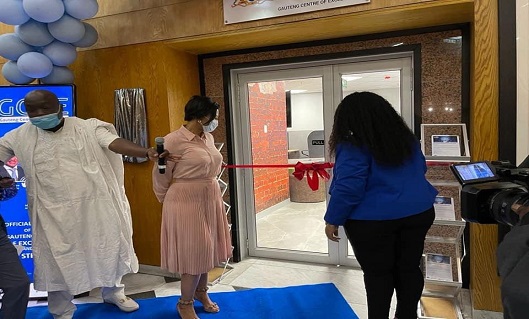Office of the Premier 2021/08/26 - 22:00

Lerato Mailoane
The Gauteng Provincial Government has unveiled the Fourth Industrial Revolution Strategy (C4IR), which lays a path for the province to provide its services digitally, in the near future.
The new strategy announced during a virtual media conference on Friday, alongside the opening of the Gauteng Centre of Excellence (GCoE) Innovation Centre is spearheaded by the Gauteng Department of e-Government.
In its development, the department was supported by the 4IR advisory panel – a fifteen-member panel appointed by Premier David Makhura, to support the government in ensuring citizens access to government services.
The new strategy rests on six pillars:
- Digital infrastructure technologies that will provide meaningful connectivity to support new businesses, underpinned by data to support decision-making and business opportunities.
- Smart procurement to drive transparency, value for money, better competition, ethics and fair dealing, and maximising accountability.
- A strategy for competitiveness and growth, supported by well-functioning data-driven e-government to support citizens and businesses. The strategy document also recommends the adoption of technologies that can increase competitiveness.
- Support, development and innovation, including the critical role of 4IR research, infrastructure for digital government – particularly service delivery – as well as private sector involvement and social innovation.
- Future skills concerned with the development of the skills to position workers and citizens for the future of work.
- 4IR governance issues, recommending new approaches to technology in the context of a rapidly changing world.
The new strategy is expected to include the establishment of a data office, the improvement of e-government services and access to them; improved spend as a result of e-procurement, the establishment of a city-region 4IR sandbox; and a skills panel in partnership with the public and private sector.
Speaking at the launch, MEC for e-Government and Finance, Ntombi Nkomo-Ralehoko said it is no longer possible to discuss economic development without factoring in the impact of the 4IR on the economy as a whole.
"Any effort we make as a country to grow our economy will now largely be shaped by how quickly we can embrace and master the technologies associated with the Fourth Industrial Revolution.
"We have to implement Cyber security, enabling digital transformation by exploring the 4th industrial revolution and by making sure that our people receive government services at a click of a button. We also share best practices with our partners by contributing to the skills gap and contribute to the skills gap in the province."
The Innovation Centre, for its part, will act as a hub for local, multi-stakeholder cooperation to develop policy frameworks and advance collaborations that accelerate the benefits of science and technology.
Nkomo-Ralehoko said the department along with partners Microsoft South Africa, Huawei amongst others come together to secure the future of Gauteng residents.
"This centre of excellence comes at the right time, where information technology has taken over all over the world and it has emerged like never before. This change challenges every country and every economy," she said.
The establishment of the centre, she added, will provide a platform for stakeholders to work together on the evolution of new technologies for improved service delivery, training the future workforce, and developing and implementing scalable 4IR infrastructure.
This will also benefit small-medium enterprises (SMEs), the youth as well as employees of the Gauteng Provincial Government.
The province has been exploring the launch of the Centre since the Industrial Revolution SA Digital Economy Summit where Gauteng Premier emphasised how the technological revolution will fundamentally alter the way we live, work and relate to one another.
RELATED NEWS
No related news

